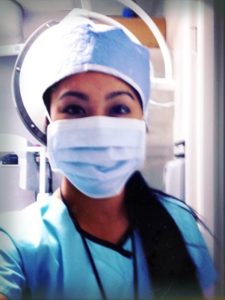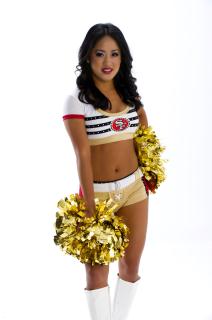 Tina, a 49ers cheerleader is dedicated to cheering and nursing. Read on!
Tina, a 49ers cheerleader is dedicated to cheering and nursing. Read on!
What turned you on to science and when?
Tina: When I was in the 1st grade, my teacher asked me what I wanted to be when I grew up and the answer was easy for me: a nurse, like my Mom. At the time, I’m sure I had no idea what it meant to be a nurse. Nevertheless, I answered so confidently and so sure of my answer. My answer was almost instinctive. However, during my early teens, I was led to believe that “there is absolutely no way I will do what my Mom does”—following what Mom did just did not sound “cool” enough for my teenage rebellious mindset. Regardless, in an effort to complete the mandatory service hours in high school, I volunteered at my mom’s hospital. This is where I really got to see what nursing was all about. And I fell in love with it. I learned to appreciate and look up to the woman my mom is. It made me realize that to follow in her footsteps would be to follow in the footsteps of someone selfless, beautiful and simply amazing. I saw that nursing is not only about the science of the human body, but it is also about helping those in need and about caring for them. It is the science of caring. So, since my experiences observing my mom, nursing has become one of my truest passions. And every now and then, I’ll think back to the 1st grade when I was so sure I wanted to be just like my mom, a nurse. It was so clear to me then and it is very clear to me today—to be a nurse is and always has been my calling in life.
Tell us about the teams you’ve cheered for, how long you’ve cheered for them, and why you tried out to be a professional cheerleader.
Tina: I danced with the Warrior Girls for 2 seasons from ’08-’10. At the end of my last season with the Warrior Girls, I graduated nursing school and decided I needed time to study for my board exam and apply for jobs. Two and a half months later, I was fortunate and blessed enough to have passed my board exam and have been offered a Registered Nurse position at the San Francisco Veteran’s Affairs Medical Center. I immediately accepted the offer. And although I missed dancing immediately after I finished my last season with the Warrior Girls, I decided it would be in my best interest to have my nursing career as my main and only focus in life at the time. Six months into my job as a Registered Nurse, I missed dancing so much! Being without it made me feel as if a part of me was missing. So, I caved and decided to finally audition for the NFL’s San Francisco 49ers Gold Rush—this was a team I had been eyeing for quite some time. I made the team and had an amazing 1st season with them as we made it to the NFC Championships.ear.
 Which came first? Your interest in science or cheerleading?
Which came first? Your interest in science or cheerleading?
It’s hard to say which I became interested in first because I truly feel that both nursing and dancing are what I was meant to do. They are my passions in life and I have been so blessed to be able to live out both of my dreams simultaneously.
What’s a typical day like for you?
Tina: Being a nurse and a professional dancer at the same time is like living 2 different lives. I am always on the go and feel like this is the life of a rockstar! It can get crazy and hectic but I love it! It’s an amazing feeling to be able to live out both of your dreams! When I was in school, a typical day would start off by going to my nursing classes. Then, I would change into my nursing scrubs and work at the hospital for my internship. Following that, I would go directly to rehearsal. On game days, sometimes, I would have to rehearse in my nursing scrubs. Then, get ready and change into my uniform and dance at the game. Then, do it all over again the next day. Now my schedule is more manageable. I am a nurse from Monday to Friday, then switch gears and be a cheerleader on the weekends.
I work as a Registered Nurse at the San Francisco Veteran’s Affairs Medical Center’s Outpatient Specialty Clinics. We have a number of different specialty clinics; e.g. Cardiology Clinic, Eye Clinic, Dermatology Clinic, Pulmonary Clinic, Urology Clinic, General Surgery Clinic and the list goes on. I float and word in all of these different clinics. Generally speaking, my job is to assist the patients and providers in these clinics to ensure that our Veterans are getting the most appropriate and efficient care.
For example, I provide education and advise patients about their health; I help take care of patients’ wounds. I assist providers with procedures; I administer vaccinations; etc.
Best part of your day job or studies?
Tina: The best part of my job is working with the Veterans. My grandfather, who means the world to me, is a Veteran of World War II. So, working at the Veteran’s hospital hits home for me. I love hearing their stories and it is very important to me that they are receiving the best care we can offer.
Do you find that stereotypes about cheerleaders helped or hindered your studies or professional experiences?
When I graduated nursing school, I was hesitant to include my “work” experiences as professional dancer in my resume. I just was not sure how employers would receive it and I was afraid of the stereotypes. However, after much consideration, I thought “why not?” Although I feared being questioned by it, I realized that by putting these experiences on my resume, the best outcome is just that—that people question me about it. That way, I will be given an opportunity to voice that my experiences as a professional cheerleader and continue to grow as an individual and as a professional. It would give me an opportunity to break the stereotype and explain to people that the women that I have met on these teams are amazing, inspiring, hard working women who have the drive and all the potential in the world to make things happen. So, I left it on my resume and I was offered an interview where I took the opportunity to explain my stance. And sure enough, I was offered the position. To this day, coworkers and colleagues at work maintain respect for me and continue to treat me as a professional. They are excited and supporting of my career outside of nursing, but they still treat me as they would any other Registered Nurse.
How do your fellow cheerleaders accept your interest in science?
Tina: My teammates are more like sisters to me. So, they are very supporting of my career as a Registered Nurse.
Do you have any advice for youngsters who might feel torn between following one dream and another?
Tina: My advice is to dream big and work hard towards those dreams. You only live once. So, should an opportunity arise, take it and run wild with it. Otherwise, you’ll beat yourself up for never having even tried.
What are your plans for the future?
Tina: Moving forward, I have big plans for furthering my career in nursing. I would love to get my Masters in Nursing and become a Nurse Practitioner. And, of course, I am going to keep on dancing.
Best cheerleading experience?
Tina: As of late, cheering for the San Francisco 49ers at the playoff game versus the New Orleans Saints is my best cheerleading experience. If you missed the game, watch it. Hands down, it was THE best game I have ever cheered at, thus far. I still get chills thinking about it. However, I also have to mention that it was an amazing experience to also have gone to Japan with the Warrior Girls to teach dance clinics and perform at the BJ League Finals (Japans equivalent to the USA’s NBA Finals).
Best science/engineering-related experience?
Tina: My best nursing-related experience happens every day—simply caring for and being with my Veterans patients makes my day.
What’s one thing people might find especially surprising about you?
Tina: I lack any and all ability or desire to cook. One of my 80-year-old patients asked me if I knew how to cook, and I replied “No”. Then, he asked, “What kind of woman are you?” 😛
If you could rewind the clock and change your degree, would you? If so, to what and why? If not, why not?
Tina: I couldn’t see myself doing anything else other than nursing. I really feel it is my calling in life.
Why do you want to be a Science Cheerleader?
Tina: It’s important to me to break the stereotype. It is important to me because voicing out my experiences gives me an opportunity to stand up for the amazing women—my sisters—I have met through dance. Also, it is especially important to me to hopefully inspire people to live out their dreams and passions in life.


Can i ask what did you have to do to be an register nurse & a NFL cheerleader?
Hi Brooklyn Battle! Great question! For one, it took A LOT of dedication and hard work. The two are two huge commitments! However, when times got rough, I was reminded that I am so blessed to be able to live out two of my life’s passions — And that was above and beyond what I ever imagined and dreamed! That pushed me to give it my all — 100% of myself to nursing and 100% of myself to dancing! Often times, I’d bring my books to practices and/or games to study whenever I could. Other times, I’d review dance routines in my head (and with subtle body movements ;P) while walking up and down then hallways while on my way to patients’ rooms. If it’s something you absolutely love, invest in it 🙂
Can i also ask what it took you to get there.? Did you have to college and major in dancing & nursing.. How get to where you are cause im trying to do the same. Im only in the 10th so i got alot of timee.